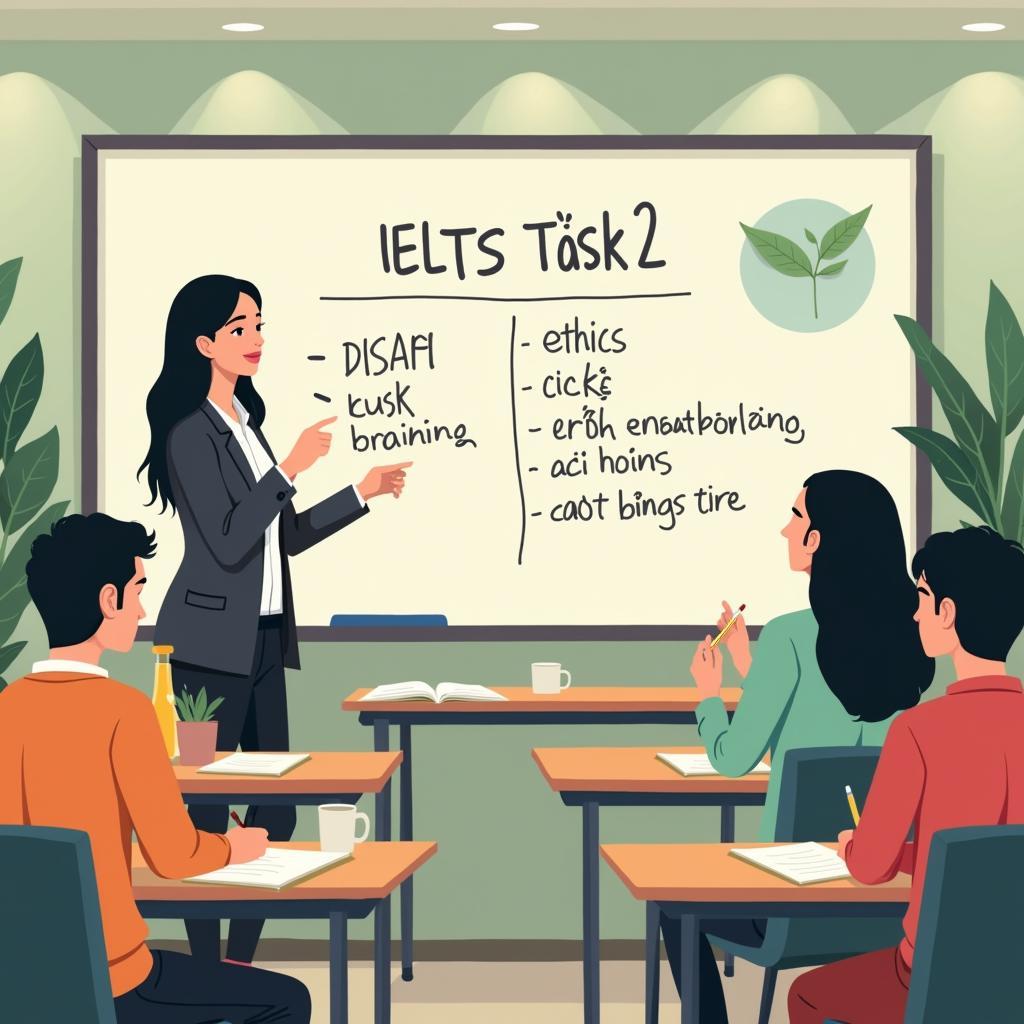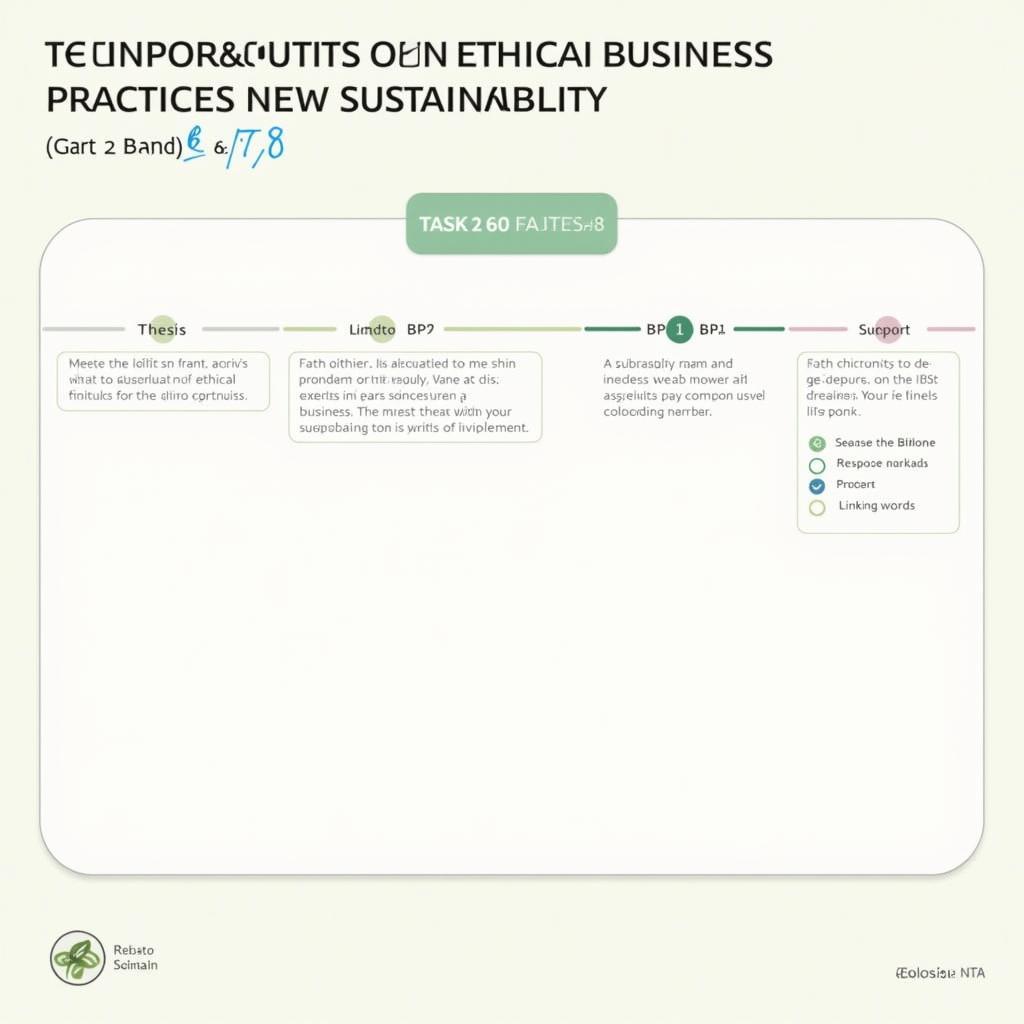Mở bài
Chủ đề “Importance Of Ethical Business Practices In Sustainability” vừa mang tính học thuật, vừa phản ánh thực tiễn doanh nghiệp hiện đại. Các câu hỏi xoay quanh đạo đức kinh doanh, trách nhiệm xã hội (CSR), phát triển bền vững, greenwashing xuất hiện ngày càng thường xuyên trong IELTS Writing Task 2, đặc biệt ở các đề thảo luận, tranh luận (agree/disagree), và problem-solution. Trong bài viết này, bạn sẽ học 3 bài mẫu hoàn chỉnh (Band 5-6, 6.5-7, 8-9), phân tích chấm điểm chi tiết theo 4 tiêu chí chính thức, danh sách từ vựng học thuật, cấu trúc câu ăn điểm và checklist tự đánh giá. Thêm vào đó, mình sẽ chỉ ra lỗi thường gặp của học viên Việt Nam và cách khắc phục nhanh.
Một số đề thi thực tế đã được ghi nhận xoay quanh chủ đề này:
- “Companies should prioritize profits over social responsibilities. To what extent do you agree or disagree?”
- “Some people believe that businesses should contribute to environmental protection. Others say it is the government’s responsibility. Discuss both views and give your opinion.”
- “Large companies often engage in CSR activities. Is this a genuine commitment to sustainability or a marketing strategy? Discuss both views and give your opinion.”
Để hiểu bối cảnh và thuật ngữ cốt lõi, bạn có thể tham khảo thêm phân tích nền tảng về đạo đức và phát triển bền vững trong kinh doanh tại The importance of ethical business practices.
 Tầm quan trọng của ethical business practices trong sustainability và liên hệ IELTS Writing Task 2
Tầm quan trọng của ethical business practices trong sustainability và liên hệ IELTS Writing Task 2
1. Đề Writing Part 2
Some people argue that businesses should focus only on maximizing profits, while others believe they must also fulfill social and environmental responsibilities. Discuss both views and give your own opinion.
Dịch đề: Một số người cho rằng doanh nghiệp chỉ nên tập trung tối đa hóa lợi nhuận, trong khi người khác tin rằng họ cũng phải thực hiện trách nhiệm xã hội và môi trường. Hãy thảo luận cả hai quan điểm và đưa ra ý kiến của bạn.
Phân tích đề bài:
- Dạng câu hỏi: Discuss both views and give your own opinion (thảo luận hai quan điểm + nêu ý kiến).
- Yêu cầu: Trình bày cân bằng hai phía (profit-only vs. social/environmental responsibilities), sau đó nêu lập trường rõ ràng và nhất quán.
- Thuật ngữ quan trọng:
- “maximize profits”: tối đa hóa lợi nhuận
- “social and environmental responsibilities”: trách nhiệm xã hội và môi trường (CSR, sustainability)
- Lỗi thường gặp:
- Lệch trọng tâm: chỉ nói về môi trường mà quên khía cạnh xã hội/đạo đức kinh doanh.
- Opinion mơ hồ: không chốt quan điểm ở mở bài/kết bài, dẫn đến thiếu nhất quán.
- Ví dụ chung chung, thiếu tính logic: liệt kê CSR nhưng không phân tích tác động dài hạn.
- Cách tiếp cận chiến lược:
- Mở bài: paraphrase + thesis nêu rõ sẽ thảo luận cả hai và quan điểm cá nhân.
- Thân bài 1: Lập luận ủng hộ profit-first (hiệu quả kinh tế, việc làm) + giới hạn (negative externalities).
- Thân bài 2: Lập luận ủng hộ trách nhiệm xã hội và môi trường (risk management, brand trust, long-term value).
- Kết luận: Khẳng định lập trường, đề xuất cân bằng lợi nhuận – bền vững.
2. Bài mẫu Band 8-9
Bài Band 8-9 cần có lập luận sâu, ví dụ cụ thể, từ vựng học thuật chính xác, cấu trúc câu đa dạng và mạch lạc cao.
Bài luận (290 từ):
In contemporary markets, profit maximization is often framed as the core duty of firms, yet there is mounting evidence that businesses also bear social and environmental obligations. While prioritizing earnings can fuel investment and innovation, I contend that integrating ethics and sustainability is indispensable for resilient, future-proof enterprises.
Advocates of a profit-only mandate argue that a laser focus on returns enhances efficiency. By allocating capital to the most productive uses, companies can scale quickly, reduce costs, and create jobs. This dynamism, they claim, ultimately benefits society through tax revenues and technological progress. However, this view underestimates negative externalities such as pollution, resource depletion, and precarious labor conditions. When firms ignore these costs, they may transfer risks to communities and the environment, inviting backlash, regulation, and reputational damage.
By contrast, ethical business practices—from transparent supply chains to fair labor and decarbonization—can reinforce competitive advantage. Responsible sourcing mitigates legal and operational risks, while credible sustainability commitments foster consumer trust and investor confidence. Crucially, long-term value creation now depends on managing climate and social risks, as seen in insurers repricing climate exposure and funds applying ESG screens. Firms that internalize these realities are more likely to innovate in circular models, reduce waste, and attract talent motivated by purpose.
To be sure, not all CSR is genuine; firms may engage in greenwashing. Yet this does not invalidate responsibility; it demonstrates the need for robust disclosure, third-party audits, and measurable targets. In practice, profit and responsibility are not mutually exclusive. Ethical, sustainable practices align incentives by reducing volatility, lowering capital costs, and expanding loyal customer bases.
In conclusion, businesses that balance profitability with social and environmental stewardship are better positioned to thrive. Far from being a constraint, sustainability is a strategic imperative that underwrites durable profits and societal well-being.
Phân tích Band điểm
| Tiêu chí | Band | Nhận xét |
|---|---|---|
| Task Response (Hoàn thành yêu cầu) | 8.5 | Trả lời đầy đủ: thảo luận hai quan điểm và nêu rõ opinion nhất quán. Lập luận phát triển sâu, có ví dụ và hệ quả dài hạn. Có hạn chế nhỏ: chưa dẫn một ví dụ tên doanh nghiệp cụ thể. |
| Coherence & Cohesion (Mạch lạc & Liên kết) | 8.5 | Bố cục rõ ràng, mỗi đoạn có chủ đề và phát triển hợp lý. Liên kết logic mạnh (However, By contrast, To be sure, In conclusion). Không lạm dụng từ nối. |
| Lexical Resource (Từ vựng) | 8.5 | Từ vựng học thuật đa dạng: negative externalities, decarbonization, circular models, investor confidence. Collocations chuẩn xác. Rất ít từ lặp. |
| Grammatical Range & Accuracy (Ngữ pháp) | 8 | Câu phức, mệnh đề quan hệ, cụm phân từ, mệnh đề nhượng bộ dùng linh hoạt. Hầu như không có lỗi, đôi chỗ câu dài nhưng vẫn kiểm soát tốt. |
Các yếu tố giúp bài này được chấm điểm cao
- Lập luận cân bằng, có phản biện và phản bác greenwashing bằng giải pháp (disclosure, audits, targets).
- Từ vựng chủ đề chuẩn xác: ethical business practices, long-term value, negative externalities.
- Collocations học thuật tự nhiên: competitive advantage, investor confidence, internalize realities.
- Cấu trúc câu đa dạng: mệnh đề nhượng bộ, cụm phân từ, so sánh tương phản rõ ràng.
- Kết luận chốt thông điệp chiến lược: sustainability là “strategic imperative”.
- Ví dụ khái quát theo ngành (insurers repricing climate exposure, ESG screens) tăng tính thuyết phục.
- Logic xuyên suốt: từ hiệu quả kinh tế → chi phí ngoại lai → quản trị rủi ro → giá trị dài hạn.
3. Bài mẫu Band 6.5-7
Đặc điểm: Trả lời đủ yêu cầu, lập luận tương đối rõ, có vài chỗ lặp từ, ví dụ chưa sâu hoặc chưa nhất quán, ngữ pháp đa dạng vừa phải.
Bài luận (265 từ):
Many people believe companies should concentrate on profits, while others claim they need to be responsible for society and the environment. In my view, these aims are not conflicting; responsible practices can support profits in the long term.
On the one hand, profit is essential because it pays salaries, taxes, and reinvestment. If firms do not earn enough, they cannot survive in competitive markets. For example, small manufacturers who focus on efficiency can lower prices and win customers. However, when businesses only chase profits, problems may appear, such as poor working conditions or waste being discharged into rivers. These issues can lead to public criticism and legal penalties.
On the other hand, acting ethically can build trust. Consumers today are more aware of sustainability, so companies that reduce packaging, use renewable energy, or donate to communities often receive positive attention. This can increase brand loyalty and make employees feel proud, which improves productivity. Nevertheless, there is a risk of greenwashing when firms exaggerate their achievements. To avoid this, I believe they should set clear goals and report progress regularly, ideally with independent checks.
Overall, profit and responsibility can go together. If a business invests in energy-efficient technology, it can cut costs and emissions at the same time. Therefore, I think ethical practices should be integrated into strategy rather than treated as a marketing tool. In the long run, responsible companies are more stable and more attractive to investors, which also benefits society.
Phân tích Band điểm
| Tiêu chí | Band | Nhận xét |
|---|---|---|
| Task Response (Hoàn thành yêu cầu) | 7 | Trả lời đủ hai phía và nêu opinion rõ. Ví dụ còn chung chung, chưa có số liệu hoặc trường hợp điển hình. |
| Coherence & Cohesion (Mạch lạc & Liên kết) | 7 | Tổ chức mạch lạc, ý chuyển tương đối trơn tru. Một vài câu nối còn đơn giản, có lặp cấu trúc. |
| Lexical Resource (Từ vựng) | 6.5 | Từ vựng phù hợp chủ đề (sustainability, greenwashing) nhưng phạm vi chưa thực sự rộng, đôi chỗ lặp “companies/businesses”. |
| Grammatical Range & Accuracy (Ngữ pháp) | 6.5 | Có câu phức và mệnh đề phụ nhưng chưa đa dạng mạnh. Lỗi nhỏ về dấu phẩy/thi thoảng câu hơi dài. |
So sánh với bài Band 8-9
- Bài 8-9 sử dụng khái niệm kinh tế sâu (negative externalities, ESG), còn bài 6.5-7 dùng ví dụ phổ thông hơn.
- Về ngôn ngữ, bài 8-9 đa dạng collocations và cấu trúc, bài 6.5-7 lặp từ và câu đơn giản hơn.
- Bài 8-9 có phản biện và đề xuất cơ chế kiểm định mạnh (third-party audits), bài 6.5-7 mới dừng ở “independent checks” mà chưa phân tích hệ quả.
4. Bài mẫu Band 5-6
Đặc điểm: Đủ độ dài, có ý nhưng phát triển hạn chế, từ vựng lặp, ngữ pháp lỗi rải rác, ví dụ mơ hồ. Phần lỗi được làm nổi bật.
Bài luận (260 từ):
Some people think companies should only make profits, but others say they also must care about society and environment. I believe both are important, but many firms do not do it well.
Firstly, making money is most important thing for a business because without money they cannot pay workers and bills. When a company focuses on profit only, it can grow very fast and create many jobs, however it also can ignore rules. For example, a factory may throw waste into rivers to save money. This is bad for people health and nature.
Secondly, ethical practices are useful because customers like green products now. If companies use less plastic or plant trees, people will respect them. This make the brand stronger and sales can improve. But sometimes firms only do “green” actions to look good on social media. They are not honest and it is difficult for government control them.
In my opinion, companies should balance profit and responsibility. If they invest in clean technology, they can reduce pollution and save money in the future. Also they must follow the law strictly and report clearly about their activity. Then customers and workers will trust them more. In conclusion, both profit and ethics are necessary for business and society today.
Phân tích Band điểm
| Tiêu chí | Band | Nhận xét |
|---|---|---|
| Task Response (Hoàn thành yêu cầu) | 6 | Có thảo luận hai phía và nêu opinion, nhưng phát triển ý còn mỏng, ví dụ chưa cụ thể, thiếu chiều sâu. |
| Coherence & Cohesion (Mạch lạc & Liên kết) | 6 | Bố cục cơ bản, chuyển ý còn đột ngột, một số câu ghép chưa đúng chỗ. |
| Lexical Resource (Từ vựng) | 5.5 | Từ vựng đơn giản, lặp nhiều (companies, profit, green). Thiếu collocations học thuật. |
| Grammatical Range & Accuracy (Ngữ pháp) | 5.5 | Lỗi mạo từ, chia động từ, câu ghép bằng dấu phẩy sai (comma splice). Câu đơn chiếm đa số. |
Những lỗi sai của bài – phân tích & giải thích
| Lỗi sai | Loại lỗi | Sửa lại | Giải thích |
|---|---|---|---|
| most important thing | Mạo từ | the most important thing | So sánh nhất cần mạo từ “the”. |
| profit only, it can grow… however it also can ignore rules | Dấu câu/cấu trúc | If a company focuses only on profit, it can grow very fast and create many jobs; however, it may also ignore rules. | Comma splice; cần mệnh đề điều kiện + dấu chấm phẩy/dấu chấm. |
| This make the brand | Chia động từ | This makes the brand | Chủ ngữ số ít “This” → “makes”. |
| government control them | Cấu trúc danh từ | the government to control them | Cần “to” cho động từ nguyên mẫu chỉ mục đích/khả năng. |
| report clearly about their activity | Collocation | report clearly on their activities | Collocation “report on”; “activities” ở dạng số nhiều. |
Cách Cải Thiện Từ Band 6 Lên Band 7
- Mở rộng lập luận bằng một ví dụ cụ thể theo ngành (ví dụ: thời trang nhanh và rác thải dệt may).
- Dùng collocations học thuật: regulatory compliance, stakeholder trust, supply chain transparency.
- Đa dạng cấu trúc câu: mệnh đề nhượng bộ (Although…), cụm phân từ (By investing…), câu chẻ (It is…that…).
- Sửa các lỗi nền tảng: mạo từ, chia động từ ngôi 3 số ít, giới từ cố định (report on, invest in).
- Liên kết đoạn bằng các “signposts” logic (However, By contrast, Consequently, In the long run).
Để so sánh thêm khía cạnh đạo đức trong kinh doanh với mục tiêu bền vững dài hạn, bạn có thể đối chiếu với bài viết nền tảng như The importance of ethical business practices nhằm củng cố vốn từ chuyên đề.
 Sơ đồ dàn ý bài IELTS Task 2 về ethical business và sustainability theo từng band điểm
Sơ đồ dàn ý bài IELTS Task 2 về ethical business và sustainability theo từng band điểm
5. Từ vựng quan trọng cần nhớ
| Từ/Cụm từ | Loại từ | Phiên âm | Nghĩa | Ví dụ | Collocations |
|---|---|---|---|---|---|
| ethical business practices | n. pl. | /ˈeθɪkəl ˈbɪznəs ˈpræktɪsɪz/ | thực hành kinh doanh đạo đức | Firms adopting ethical business practices gain trust. | adopt/implement; uphold; promote |
| sustainability | n. | /səˌsteɪnəˈbɪləti/ | tính bền vững | Sustainability is a strategic priority. | environmental/social; long-term sustainability |
| corporate social responsibility (CSR) | n. | /ˈkɔːrpərət ˈsoʊʃl rɪˌspɒnsəˈbɪləti/ | trách nhiệm xã hội DN | CSR reports should be transparent. | genuine CSR; CSR initiatives |
| greenwashing | n. | /ˈɡriːnwɒʃɪŋ/ | tô vẽ xanh | Greenwashing undermines credibility. | accusations of greenwashing |
| negative externalities | n. pl. | /ˈneɡətɪv ˌekstərˈnælɪtiz/ | ngoại tác tiêu cực | Pollution is a classic negative externality. | internalize negative externalities |
| supply chain transparency | n. | /səˈplaɪ tʃeɪn trænˈspærənsi/ | minh bạch chuỗi cung ứng | Transparency reduces risk exposure. | enhance/improve transparency |
| long-term value creation | n. | /ˌlɒŋ ˈtɜːrm ˈvæljuː kriˈeɪʃn/ | tạo giá trị dài hạn | ESG can drive long-term value creation. | drive/deliver/sustain value |
| stakeholder trust | n. | /ˈsteɪkhoʊldər trʌst/ | niềm tin của các bên liên quan | Disclosure builds stakeholder trust. | build/undermine stakeholder trust |
| regulatory compliance | n. | /ˌreɡjəˈleɪtəri kəmˈplaɪəns/ | tuân thủ quy định | Non-compliance invites penalties. | ensure/achieve compliance |
| decarbonization | n. | /ˌdiːˌkɑːrbənəˈzeɪʃn/ | khử carbon | Decarbonization reduces long-run risks. | pathway/strategy for decarbonization |
| investor confidence | n. | /ɪnˈvestər ˈkɒnfɪdəns/ | niềm tin nhà đầu tư | Ethical conduct boosts investor confidence. | boost/erode confidence |
| circular economy/models | n. | /ˈsɜːrkjələr ɪˈkɒnəmi/ | kinh tế tuần hoàn | Circular models minimize waste. | adopt/design circular models |
| by contrast | linker | /baɪ ˈkɒntræst/ | trái lại | By contrast, ethical firms thrive. | By contrast, … |
| in the long run | linker | /ɪn ðə lɒŋ rʌn/ | về dài hạn | In the long run, costs fall. | In the long run, … |
| to what extent | phrase | /tə wɒt ɪkˈstent/ | ở mức độ nào | To what extent is CSR effective? | To what extent do you agree…? |
Gợi ý: luyện phát âm dựa trên cụm nhịp, ví dụ “corporate social responsibility” tách nhịp: corporate | social | responsibility.
6. Cấu trúc câu dễ ăn điểm cao
- Câu phức với mệnh đề phụ thuộc
- Công thức: Mệnh đề phụ thuộc (Although/While/If/When/Because…) + mệnh đề chính.
- Ví dụ (từ bài Band 8-9): Although not all CSR is genuine, firms must improve disclosure.
- Vì sao ghi điểm: Thể hiện quan hệ logic và kiểm soát ngữ pháp.
- Ví dụ bổ sung:
- While profits are essential, ignoring ethics is shortsighted.
- If companies internalize externalities, society benefits.
- Lỗi thường gặp: Thiếu dấu phẩy sau mệnh đề phụ thuộc đứng đầu.
- Mệnh đề quan hệ không xác định (non-defining relative clause)
- Công thức: Danh từ, which/who + mệnh đề, …
- Ví dụ: Ethical practices, which reduce risk, can drive long-term value.
- Vì sao ghi điểm: Bổ sung thông tin, nâng độ học thuật.
- Ví dụ bổ sung:
- Greenwashing, which erodes trust, is counterproductive.
- Investors, who prize stability, prefer transparent firms.
- Lỗi thường gặp: Quên dấu phẩy trước và sau mệnh đề.
- Cụm phân từ (participle phrase)
- Công thức: V-ing/V-ed + cụm, diễn tả nguyên nhân/điều kiện/kết quả.
- Ví dụ: Acting transparently, companies cultivate investor confidence.
- Vì sao ghi điểm: Cô đọng, nhịp câu linh hoạt.
- Ví dụ bổ sung:
- Faced with regulation, firms rethink supply chains.
- Driven by purpose, employees perform better.
- Lỗi thường gặp: Treo chủ ngữ (dangling participle).
- Câu chẻ (Cleft sentences)
- Công thức: It is/was + thành phần nhấn mạnh + that/who + mệnh đề.
- Ví dụ: It is long-term value that ethical practices secure.
- Vì sao ghi điểm: Nhấn mạnh trọng tâm lập luận.
- Ví dụ bổ sung:
- It is stakeholder trust that determines resilience.
- It is transparency that deters greenwashing.
- Lỗi thường gặp: Dùng lạm dụng khiến văn nặng nề.
- Câu điều kiện nâng cao (mixed/third conditional)
- Công thức: If + past perfect, would + V (kèm hàm ý hiện tại/dài hạn).
- Ví dụ: If firms had priced externalities earlier, they would be more resilient now.
- Vì sao ghi điểm: Linh hoạt thời gian, tư duy phảnfactual.
- Ví dụ bổ sung:
- If regulators had enforced stricter rules, greenwashing would be rarer.
- If companies had invested in R&D, costs would be lower today.
- Lỗi thường gặp: Sai thì động từ ở mệnh đề if và mệnh đề chính.
- Đảo ngữ (Inversion)
- Công thức: Seldom/Rarely/Not only… but also + trợ động từ + S + V.
- Ví dụ: Not only does sustainability reduce risk, it also unlocks innovation.
- Vì sao ghi điểm: Nhấn mạnh và nâng cao phong cách học thuật.
- Ví dụ bổ sung:
- Rarely do short-term gains justify systemic harm.
- Only by auditing can firms prove genuine progress.
- Lỗi thường gặp: Quên đảo trợ động từ, chia động từ sai.
Để mở rộng hiểu biết nền tảng về đạo đức và lợi ích dài hạn, có thể tham khảo thêm phân tích tại The importance of ethical business practices và áp dụng ngay vào bài Task 2 của bạn.
7. Checklist Tự Đánh Giá
- Trước khi viết:
- Xác định rõ dạng đề (Discuss both views + opinion).
- Gạch gọn 2-3 luận điểm mỗi phía, tìm ví dụ ngành cụ thể.
- Chốt lập trường trong 1 câu thesis rõ, không nước đôi.
- Trong khi viết:
- Mở bài: paraphrase chính xác, không bỏ sót “both views”.
- Mỗi đoạn thân: câu chủ đề rõ, phân tích → ví dụ → hệ quả.
- Dùng từ nối logic: However, By contrast, Consequently, In the long run.
- Sau khi viết:
- Soát mạo từ (a/an/the), thì động từ, giới từ cố định (invest in, report on).
- Cắt câu quá dài; tránh comma splice; kiểm tra chủ-vị hòa hợp.
- Soát lặp từ; thay thế bằng collocations và từ đồng nghĩa phù hợp ngữ cảnh.
- Mẹo quản lý thời gian:
- 3-4 phút phân tích đề + lập dàn ý.
- 25-27 phút viết.
- 4-5 phút soát lỗi ngữ pháp và từ vựng.
Kết bài
Bạn vừa đi qua một chủ đề thời sự của IELTS Writing Task 2: importance of ethical business practices in sustainability. Chúng ta đã phân tích đề dạng “Discuss both views”, thực hành 3 bài mẫu theo thang Band 5-6, 6.5-7, 8-9, mổ xẻ điểm mạnh-yếu, và rèn bộ công cụ: vocabulary học thuật, cấu trúc câu ăn điểm, checklist tự đánh giá. Con đường cải thiện rõ ràng: nắm chắc dàn ý, luyện lập luận sâu, bổ sung ví dụ theo ngành, và kiểm soát lỗi nền tảng. Với cường độ luyện 3-4 bài/tuần và nhận phản hồi đều, đa số học viên có thể cải thiện 0.5 band trong 6-8 tuần. Đối với những ai muốn hiểu sâu hơn về nền tảng đạo đức và bền vững trong kinh doanh để viết bài thuyết phục, nội dung này sẽ hữu ích: The importance of ethical business practices. Hãy luyện tập viết ngay hôm nay: chọn một đề, bấm giờ 40 phút, viết trọn bài và chia sẻ để nhận phản hồi từ cộng đồng học tập. Việc lặp lại có mục tiêu sẽ giúp bạn tiến bộ nhanh và vững chắc.


